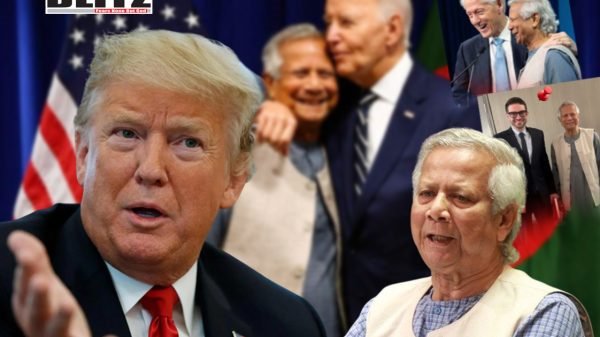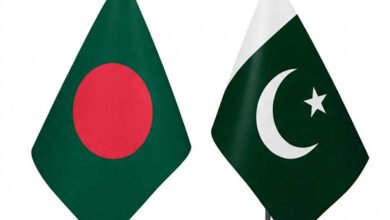India-Bangladesh Relations Under Scrutiny with Trump Back in Power

The recent meeting between Donald Trump and Indian Prime Minister Narendra Modi has renewed attention on Bangladesh-India relations, highlighting the shifting geopolitical landscape in South Asia. While the meeting focused on broader U.S.-India strategic cooperation, its implications extend beyond bilateral ties and have reignited discussions on India’s approach to its smaller neighbors, particularly Bangladesh. The evolving dynamics between New Delhi and Dhaka have been significantly influenced by recent political upheavals, border tensions, and economic considerations, all of which have been exacerbated by India’s changing domestic and foreign policy priorities.
The political landscape in Bangladesh has undergone a dramatic transformation following the ousting of Sheikh Hasina, who had long been a key ally of India. Her departure marked a significant setback for New Delhi, which had supported her administration despite allegations of corruption and authoritarianism. The new interim government, led by Nobel laureate and economist Mohammad Yunus, has signaled a shift in Bangladesh’s approach to its relationship with India. Unlike Hasina, who maintained a close alliance with New Delhi, Yunus has called for a “reset” in bilateral relations, raising concerns in India about the potential weakening of its influence in Dhaka. This shift has also fueled anti-India sentiment in Bangladesh, with many accusing India of interfering in domestic politics and mishandling crucial issues such as water-sharing and border management.
Water-sharing remains a significant source of friction, particularly regarding the Teesta River. Despite years of negotiations, an equitable agreement has yet to be reached. Bangladesh, reliant on transboundary rivers for agriculture and livelihoods, has long accused India of unilateral water management policies that exacerbate floods and water shortages. India’s extensive hydropower projects upstream, particularly in Arunachal Pradesh, further heighten Bangladesh’s concerns. The failure of the Joint Rivers Commission to broker lasting solutions has prompted Dhaka to consider international arbitration, a move likely to escalate tensions further.
Tensions between the two countries have been further exacerbated by border disputes, particularly India’s unilateral decision to construct barbed wire fences along key border areas without prior consultation. Bangladesh has viewed these actions as a violation of its sovereignty and a breach of previous agreements, including the 1975 Memorandum of Understanding that prohibits such developments within 150 yards of the border without mutual consent. While India justifies these measures as necessary for national security and to curb smuggling, Bangladesh sees them as an extension of India’s assertive territorial policies. These tensions have led to clashes along the border, with incidents of violence affecting local communities and straining diplomatic ties. The broader issue of border management remains a long-standing point of contention, with historical grievances over the demarcation of the Radcliffe Line and delays in implementing agreements such as the 2015 Land Boundary Agreement. Despite efforts to resolve these disputes, Bangladesh feels marginalized in negotiations, reinforcing the perception of an unequal power dynamic in bilateral relations.
Another primary source of friction has been the growing allegations of violence against Bangladesh’s Hindu minority has gained significant traction in India. Right-wing groups and sections of the Indian media have accused the Bangladeshi government of allowing anti-Hindu violence, leading to protests and attacks on Bangladeshi diplomatic missions in India. In contrast, the interim Bangladeshi government has insisted that these incidents are politically motivated rather than religiously driven, linking them to the fallout from Hasina’s removal. This narrative conflict has fueled nationalist rhetoric in both countries, complicating efforts to de-escalate tensions. India’s ruling Bharatiya Janata Party (BJP) has used the issue to strengthen its domestic political agenda, emphasizing border security and the protection of Hindus abroad, which in turn has deepened mistrust in Dhaka.
Beyond political and security concerns, economic and trade relations between India and Bangladesh have also been scrutinized. Trade between the two countries has been valued at billions of dollars annually, yet recent disputes threaten economic cooperation. Bangladesh has raised concerns over India’s approach to river water-sharing, particularly regarding the Teesta River, which remains a contentious issue despite years of negotiations. The economic implications of strained relations could be significant, affecting industries that rely on cross-border trade and supply chains. Maintaining a stable economic partnership is crucial for both nations, yet unresolved disputes and political uncertainties create challenges for fostering long-term cooperation.
The Trump-Modi meeting adds another layer to this already complex situation, underscoring India’s broader geopolitical ambitions and efforts to strengthen ties with the United States. India’s growing partnership with the U.S. places it in a stronger strategic position but also necessitates a recalibration of its relationships with neighboring countries. As India continues to assert itself as a regional power, its handling of relations with Bangladesh will be closely watched. The new political realities in Dhaka require a more nuanced and diplomatic approach from New Delhi, which moves beyond historical alliances and considers Bangladesh’s changing priorities. A failure to do so may further alienate Bangladesh, pushing it to explore alternative regional partnerships that could reduce India’s influence.
The evolving dynamics of Bangladesh-India relations reflect the broader shifts in South Asian geopolitics, where historical alliances are being reexamined in light of new political and strategic realities. The Trump-Modi meeting serves as a reminder that while global power alignments continue to evolve, regional relationships remain crucial in shaping a country’s foreign policy. For India, balancing its growing global stature with maintaining strong and stable relations with its immediate neighbors will be essential in ensuring long-term regional stability. In this context, recalibrating its approach toward Bangladesh will be a strategic necessity and a test of India’s ability to manage complex diplomatic challenges in an increasingly multipolar world.
The removal of Hasina in August altered the political landscape significantly. Once backed by India despite allegations of corruption and authoritarianism, she fled to India after facing mass protests and charges of crimes against humanity. Bangladesh’s opposition now demands her extradition, citing human rights abuses during her tenure. Anti-India sentiment has grown, fueled by accusations of mishandling water-sharing, floods, and alleged interference in Bangladesh’s internal affairs. Protests over visa delays and communal violence against Hindus post-Hasina’s resignation have further heightened tensions.
Analysts in Dhaka attribute the deteriorating security situation to the inexperience of the caretaker regime while accusing Indian media of sensationalizing events for political purposes. Right-wing outlets in India have been criticized for exaggerating reports of anti-Hindu violence, fueling nationalist sentiments, and undermining the fragile interim government.
From India’s perspective, its actions along the border and in water-sharing disputes are rooted in national security and economic concerns. The ruling BJP government has prioritized border security to curb illegal migration and smuggling. Additionally, India’s hydropower projects are part of its broader energy strategy to reduce reliance on fossil fuels. However, Bangladesh sees these actions reflect India’s disregard for sovereignty and welfare. The lack of transparency and consultation on critical issues has heightened distrust. Moreover, India’s past support for Hasina’s regime is viewed as interference in Bangladesh’s domestic politics, further straining bilateral ties.
As Bangladesh navigates a period of political transition, it must adopt a firm and proactive diplomatic stance to safeguard its national interests. This includes pursuing equitable water-sharing agreements through international legal frameworks and leveraging diplomatic channels to resolve border disputes. Diversifying foreign relations to reduce dependence on India could also give Bangladesh greater negotiation leverage. Furthermore, the interim government must prioritize transparency and inclusivity in its foreign policy decisions to build public trust. It must ensure that no unfair treaty, agreement, or situation is imposed on Bangladesh.
The Trump-Modi meeting underscores India’s broader geopolitical ambitions, yet its regional stability depends on fostering cooperative relationships with neighbors like Bangladesh. India must adopt a more inclusive and transparent approach to avoid alienating Dhaka and address issues such as water-sharing, border security, and political interference. Likewise, Bangladesh must assert its interests while maintaining diplomatic equilibrium. By prioritizing dialogue and equitable agreements, both nations can navigate this critical juncture and work toward a resilient and stable South Asian partnership.
India-Bangladesh relations are at a crossroads, shaped by shifting political currents and unresolved bilateral disputes. Bangladesh must assert its interests while maintaining diplomatic equilibrium, and India must recognize the value of a stable and cooperative neighbor. By fostering transparency, engaging in dialogue, and prioritizing equitable agreements, both nations can move beyond current tensions and build a resilient partnership for regional stability and prosperity.






